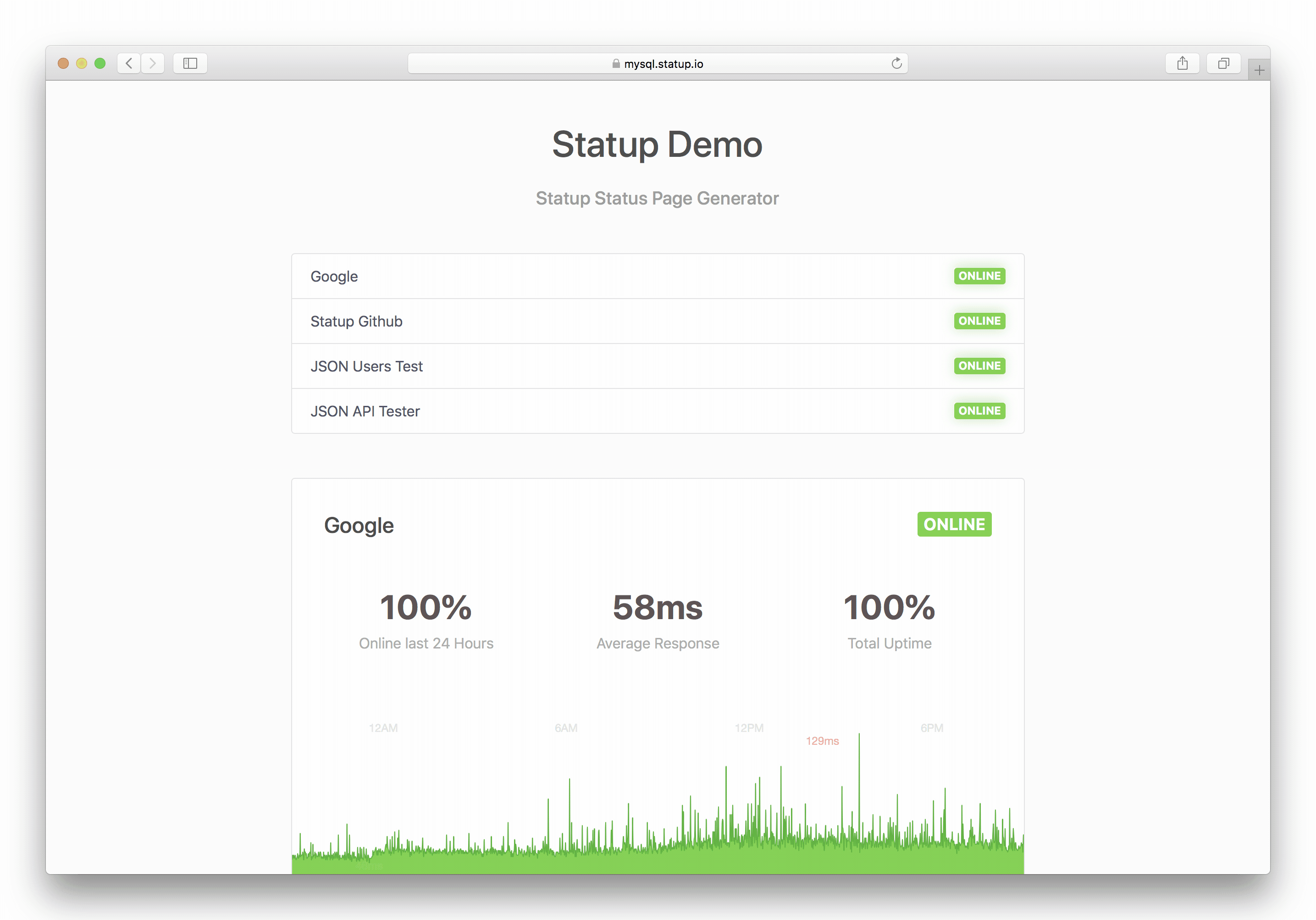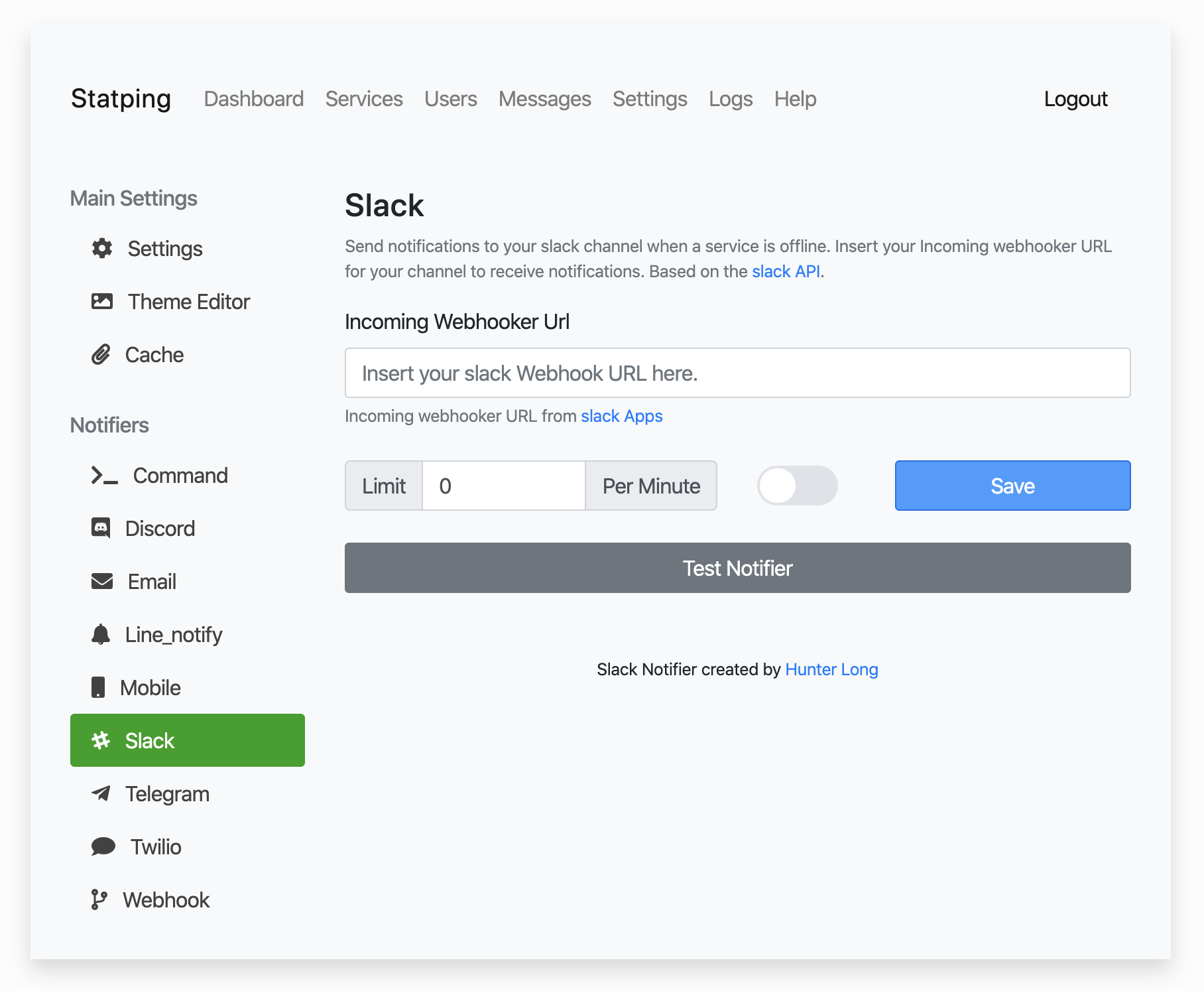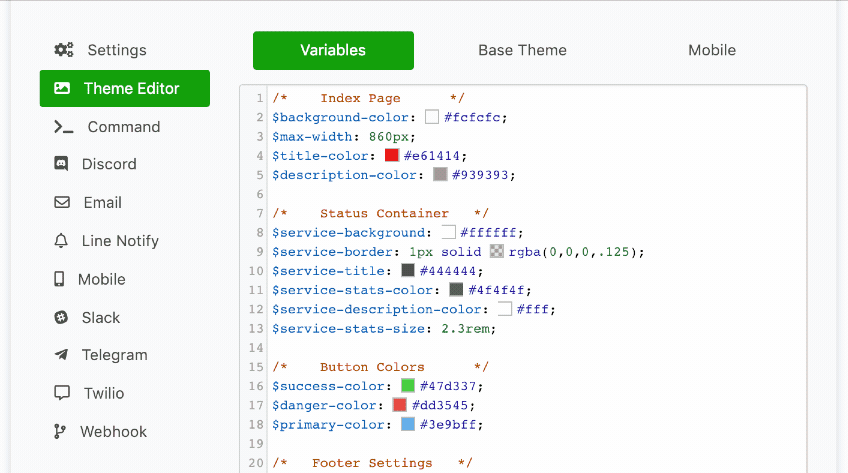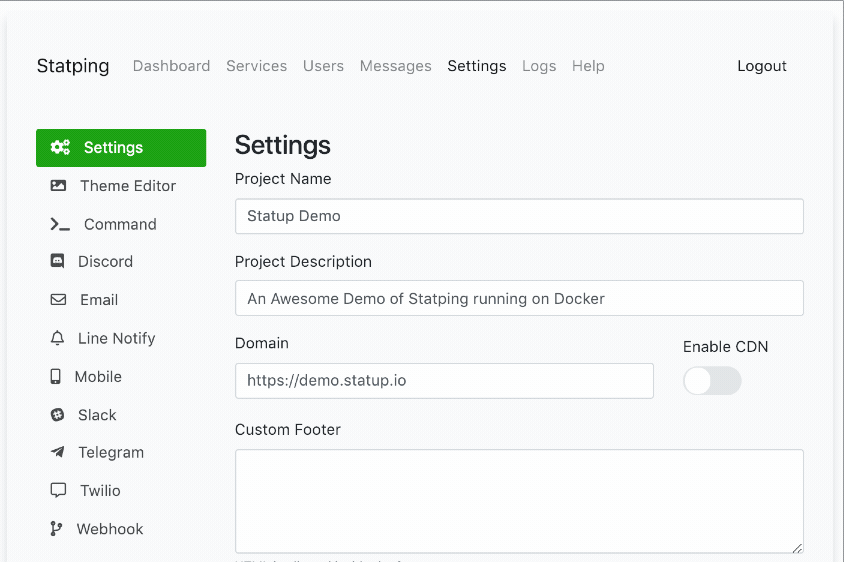|
|
||
|---|---|---|
| .github/workflows | ||
| .vscode | ||
| cmd | ||
| database | ||
| dev | ||
| frontend | ||
| handlers | ||
| notifiers | ||
| source | ||
| types | ||
| utils | ||
| .dockerignore | ||
| .gitattributes | ||
| .gitignore | ||
| .gitmodules | ||
| CHANGELOG.md | ||
| CloudronManifest.json | ||
| Dockerfile | ||
| LICENSE | ||
| Makefile | ||
| README.md | ||
| app.json | ||
| doc.go | ||
| docker-compose.yml | ||
| go.mod | ||
| go.sum | ||
| install.sh | ||
| snapcraft.yaml | ||
README.md
Statping-ng - Web and App Status Monitoring for Any Type of Project
Website |
Wiki
Linux |
Windows |
Mac |
Containers
Statping-ng - Status Page & Monitoring Server
An easy to use Status Page for your websites and applications. Statping will automatically fetch the application and render a beautiful status page with tons of features for you to build an even better status page. This Status Page generator allows you to use MySQL, Postgres, or SQLite on multiple operating systems.
Statping-ng aims to be an updated drop-in replacement of statping after development stopped on the original fork.




About Statping-ng

A Future-Proof Status Page
Statping-ng strives to remain future-proof and remain intact if a failure is created. Your Statping-ng service should not be running on the same instance you're trying to monitor. If your server crashes your Status Page should still remaining online to notify your users of downtime.
 - Login is admin, password admin.
- Login is admin, password admin.
No Requirements - Run on Any Server
Statping-ng is built in Go Language so all you need is the pre-compiled binary based on your operating system. You won't need to install anything extra once you have the Statping binary installed. Windows, Linux or Mac, We compile to all the popular systems, including Raspberry Pi!

Lightweight and Fast
Statping-ng is a very lightweight application and is available for Linux, Mac, and Windows. The Docker image is only ~20Mb so you know that this application won't be filling up your hard drive space. The Status binary for all other OS's is ~17Mb at most.
Want easy containers?
No Worries, we provide docker containers for many different system architectures, with multiple docker-compose files to suit your needs, you can even bring your own SSL Certificate or automatically leverage Lets Encrypt to keep things secure. But it's can be as simple as a docker run!

Custom SASS Styling
Statping-ng will allow you to completely customize your Status Page using SASS styling with easy to use variables. The container image actually contains a pre-built SASS binary so you won't even need to setup anything!
Compatible with the Statping App
Statping-ng is 100% compatible with the statping app which is available on the Apple App Store and Google Play for free. The app will allow you to view services, receive notifications when a service is offline, update groups, users, services, messages, and more! Start your own Statping-ng server and then connect it to the app by scanning the QR code in settings.
The mobile app is not maintained by statping-ng and includes in-app purchases to the developer of statping.
Notifications - Slack, Email, Twilio and more
Statping-ng includes email notification via SMTP and Slack integration using Incoming Webhook. Insert the webhook URL into the Settings page in Statping-ng and enable the Slack integration. Anytime a service fails, the channel that you specified on Slack will receive a message.
View the Plugin Wiki to see detailed information about Golang Plugins. Statping-ng isn't just another Status Page for your applications, it's a framework that allows you to create your own plugins to interact with every element of your status page. Notifier's can also be create with only 1 golang file.

Easy to use Dashboard
Having a straight forward dashboard makes Statping-ng that much better. Quickly and Easy view statuses. Monitor your websites and applications with a basic HTTP GET request, or add a POST request with your own JSON to post to the endpoint.

Quick Start
Here's a few quick start guides to get you going, fast.
Docker
Use the Statping Docker Image to create a status page in seconds. Checkout the Docker Wiki to view more details on how to get started using Docker.
docker run -it -p 8080:8080 adamboutcher/statping-ng
Docker Compose
In the root (base) folder there is a standard docker-compose file that includes nginx, postgres, and Statping-ng.
docker-compose up -d
Docker Compose with Automatic SSL
You can automatically start a Statping-ng server with automatic SSL encryption using this docker-compose file. First point your domain's DNS to the Statping-ng server, and then run this docker-compose command with DOMAIN and EMAIL. Email is for letsencrypt services.
LETSENCRYPT_HOST=mydomain.com \
LETSENCRYPT_EMAIL=info@mydomain.com \
docker-compose -f docker-compose-ssl.yml up -d
Once your instance has started, it will take a moment to get your SSL certificate. Make sure you have a A or CNAME record on your domain that points to the IP/DNS of your server running Statping-ng.
Prometheus Exporter
Statping-ng includes a Prometheus Exporter so you can have even more monitoring power with your services. The Prometheus exporter can be seen on /metrics, simply create another exporter in your prometheus config. Use your Statping-ng API Secret for the Authorization Bearer header, the /metrics URL is dedicated for Prometheus and requires the correct API Secret has Authorization header.
scrape_configs:
- job_name: 'statping'
bearer_token: 'MY API SECRET HERE'
static_configs:
- targets: ['statping:8080']
Contributing
Statping-ng accepts Push Requests to the dev branch!
Feel free to add your own features and notifiers.You probably want to checkout the Notifier Wiki to get a better understanding on how to create your own notification methods for failing/successful services.
Testing on Statping-ng will test each function on MySQL, Postgres, and SQLite. I recommend running MySQL and Postgres Docker containers for testing.
You can find multiple docker-compose files in the dev directory.









